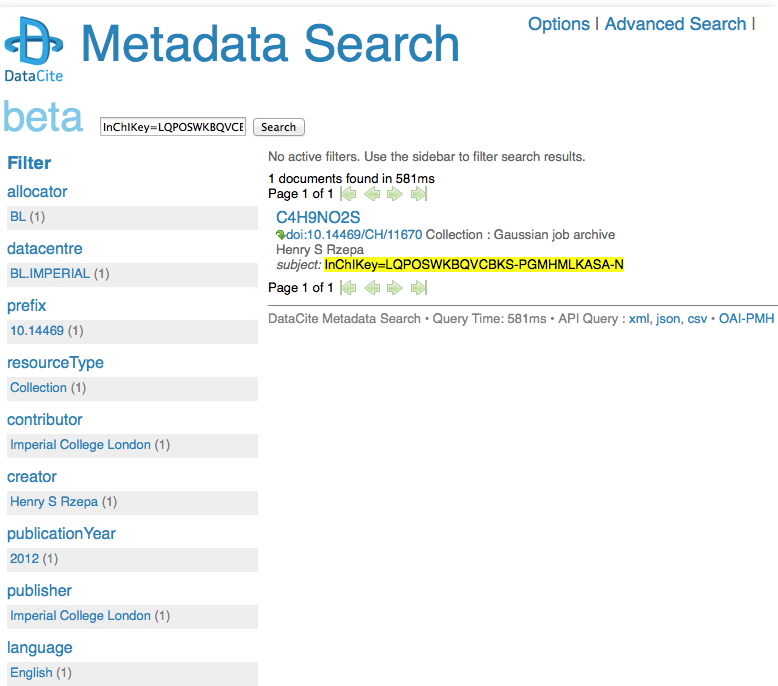Posts Tagged ‘search engine’
Saturday, February 16th, 2019
The title of this post comes from the site www.crossref.org/members/prep/ Here you can explore how your favourite publisher of scientific articles exposes metadata for their journal.
(more…)
Tags:Aaron Swartz, Academic publishing, API, Business intelligence, CrossRef, data, Data management, Elsevier, favourite publisher, Identifiers, Information, Information science, Knowledge, Knowledge representation, metadata, mining, ORCiD, PDF, Pre-exposure prophylaxis, Publishing, Publishing Requirements for Industry Standard Metadata, Records management, Research Object, Scholarly communication, Scientific literature, search engine, social media, Technical communication, Technology/Internet, text mining, Written communication, XML
Posted in Interesting chemistry | 1 Comment »
Wednesday, March 7th, 2018
C&EN has again run a vote for the 2017 Molecules of the year. Here I take a look not just at these molecules, but at how FAIR (Findable, Accessible, Interoperable and Reusable) the data associated with these molecules actually is.
(more…)
Tags:Carotenoids, Chemistry, Epoxides, Macrocycles, Organic chemistry, Organofluorides, PDF, Peptides, search engine, search program, search.datacite.org search engine, Technology/Internet
Posted in Chemical IT, crystal_structure_mining, Interesting chemistry | No Comments »
Sunday, March 5th, 2017
Living in London, travelling using public transport is often the best way to get around. Before setting out on a journey one checks the status of the network. Doing so today I came across this page: our open data from Transport for London.
(more…)
Tags:API, chemical databases, City: London, Company: TfL, Government, Greater London, Local government in London, London, Passenger Transportation Ground & Sea - NEC, PDF, Public transport, Route planning software, search engine, Sustainable transport, Technology/Internet, Transport, Transport for London, travel apps, travel data, XML
Posted in Chemical IT | No Comments »
Wednesday, April 8th, 2015
Last August, I wrote about data galore, the archival of data for 133,885 (134 kilo) molecules into a repository, together with an associated data descriptor[1] published in the new journal Scientific Data. Since six months is a long time in the rapidly evolving field of RDM, or research data management, I offer an update in the form of some new observations.
(more…)
References
- R. Ramakrishnan, P.O. Dral, M. Rupp, and O.A. von Lilienfeld, "Quantum chemistry structures and properties of 134 kilo molecules", Scientific Data, vol. 1, 2014. https://doi.org/10.1038/sdata.2014.22
Tags:API, RCSB Protein Data Bank, search engine
Posted in Chemical IT | No Comments »
Saturday, May 17th, 2014
I remember a time when tracking down a particular property of a specified molecule was an all day effort, spent in the central library (or further afield). Then came the likes of STN Online (~1980) and later Beilstein. But only if your institution had a subscription. Let me then cut to the chase: consider this URL: http://search.datacite.org/ui?q=InChIKey%3DLQPOSWKBQVCBKS-PGMHMLKASA-N The site is datacite, which collects metadata about cited data! Most of that data is open in the sense that it can be retrieved without a subscription (but see here that it is not always made easy to do so). So, the above is a search for cited data which contains the InChIkey LQPOSWKBQVCBKS-PGMHMLKASA-N. This produces the result:

This tells you who published the data (but oddly, its date is merely to the nearest year? It is beta software after all). The advanced equivalent of this search looks like this:
(more…)
Tags:beta software, generic data search, molecular search engines, search engine, search engine optimisation, search looks, software agents
Posted in Chemical IT | No Comments »
